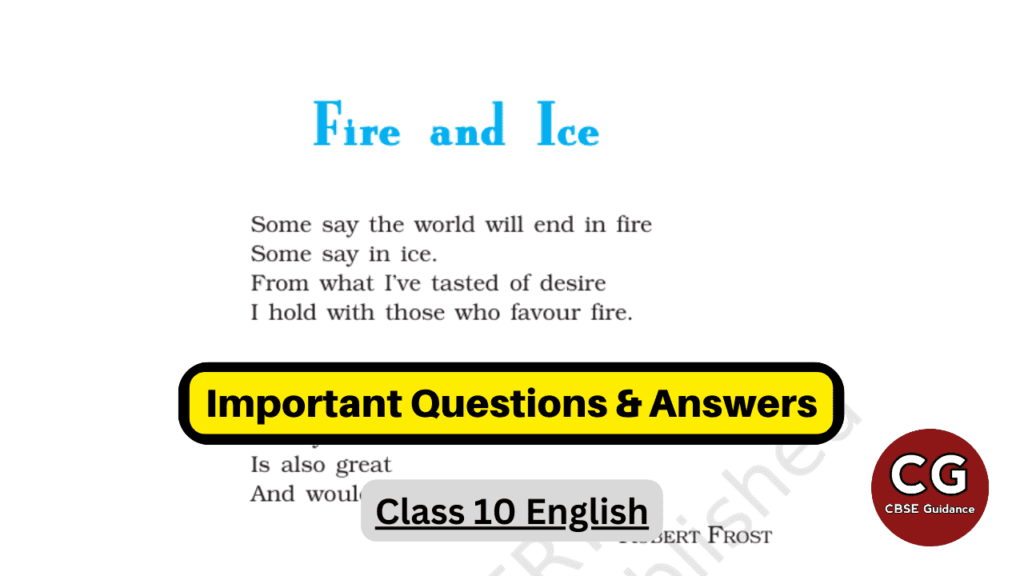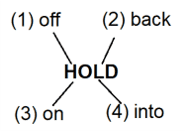Preparing for your First Flight Poem Fire and Ice Class 10 exam? Look no further! Here are some important questions and answers of this poem by Robert Frost that will help you ace your test. From the themes and characters to the plot and literary devices, we've got you covered. You can also download the PDF of these important/extra questions answers and take a printout of it and use it for study.

| Subject | English Language & Literature |
| Class | 10 |
| Board | CBSE |
| Chapter Name | Fire and Ice |
| Type | Important Questions and Answers |
| Session | 2024-25 |
| Book Name | First Flight |
| Literature | Poem |
I can accept failure, but I can't accept not trying.
- Michael Jordan
Fire and Ice Class 10 Extra Questions and Answers
Q. No. 1) According to the poem 'Fire and Ice', some people say that the world will end in ice because humans are __________.
a. greedy for wealth and power
b. becoming spiteful towards each other
c. passive towards the problem of climate change
d. becoming increasingly unconcerned about security
Ans. Option (b)
Q. No. 2) Which option correctly replaces the underlined phrase in the given line from Fire and Ice?
I hold with those who favor fire.
a. am as experienced as
b. strongly disagrees with
c. have the same opinion as
d. habitually avoid
Ans. Option (c)
Q. No. 3) Read the extract given below and answer the questions that follow:
But if it had to perish twice,
I think I know enough of hate
To say that for destruction ice
Is also great
And would suffice.
i. Fill in the blank with one word.
When the speaker says that ice could also bring about the end of the world, he refers to __________, as the means for destruction.
Ans. hatred/indifference/bitterness/apathy/detachment/rigidity
ii. What does the speaker's alignment with those who favor ice, suggest?
Ans. The speaker's alignment with those who favor ice suggests that they have seen the destructive consequences of a lack of empathy and emotional connection.
iii. Which of the following best describes the speaker's attitude towards destruction caused by ice?
a. Indifferent
b. Fearful
c. Dismissive
d. Respectful
Ans. Option (d)
iv. Comment on the poet’s use of language in these lines.
Ans. The language used in these lines is simple and straightforward. The words and phrases are easy to understand and the poem is written in a conversational tone. Despite its simplicity, however, the poem carries a profound message about the destructive power of both fire and ice and the inevitability of destruction. The use of simple language in this context makes the message more accessible to a wider audience and adds to the poem's overall impact.
Q. No. 4) Read the extract given below and answer the questions that follow:
Some say the world will end in fire,
Some say in ice.
From what I’ve tasted of desire
I hold with those who favor fire.
But if it had to perish twice,
I think I know enough of hate
To say that for destruction ice
Is also great
And would suffice.
i. Choose the CORRECT statement about the given poem.
a. Fire and ice are images—they help the readers visualize the power of nature over man.
b. Fire and ice are symbols—not of natural disasters, but of humanity’s ability to create disasters of its own.
c. Fire and ice are elements—not of Nature but man-made and possess the ability to create havoc for mankind.
d. Fire and ice are agents—they change the thinking of mankind from negative to positive and bring harmony.
Ans. Option (b)
ii. Select the option that correctly classifies the connotations of fire and ice, as suggested in the poem.
- rage
- violence
- indifference
- hate
- greed
a. Fire- 3,4; Ice- 1,2,5
b. Fire- 2, 5; Ice-1,3,4
c. Fire-1,3,5; Ice-2, 4
d. Fire- 1,2,4; Ice- 3,5
Ans. Option (d)
iii. The poem is a _________, put across by the poet.
a. powerful warning
b. heartfelt apology
c. earnest appeal
d. vengeful threat
Ans. Option (a)
iv. The poet uses the phrasal verb -hold with. Choose the option that DOES NOT indicate a valid phrasal verb.

a. Option 1
b. Option 2
c. Option 3
d. Option 4
Ans. Option (d)
v. Pick the option that is NOT TRUE about the poet according to the extract. The poet
a. is inclined to believe that the world would most likely end with fire.
b. has heard divided opinions about the way the world would end in all likelihood.
c. preaches love and kindness to combat the spread of hate among all.
d. declares the power of ice to be as destructive as that of fire.
Ans. Option (c)
vi. Identify the most likely tone of the poet in the lines- ‘To say that for destruction ice/Is also great’.
a. sarcastic
b. serious
c. amused
d. Celebratory
Ans. Option (a)
Q. No. 5) Explain why the poet personally holds the conviction that the world will primarily end in fire.
Ans. He was a victim of the fiery aspect of desire.
By his own admission, (From what I’ve tasted ……) he had experienced its destructive effects in his life.
Q. No. 6) "Fire and Ice" was first published in 1920. Briefly explain how World War I might have influenced the theme of the poem.
Ans. Certainly! It is possible that World War I influenced the theme of the poem "Fire and Ice" by Robert Frost. The war was a time of great destruction and devastation, and it may have led Frost to contemplate the destructive forces of humanity.
In the poem, Frost discusses the end of the world and considers two possible scenarios for how it might happen: through fire or through ice. Fire and ice are often associated with destruction and chaos, and it's possible that Frost was using these symbols to comment on the destructive forces of humanity that had been unleashed during the war.
Q. No. 7) Create a tagline/slogan/catchphrase for the poem.
Ans.
- "Two paths to destruction: which will win in the end?"
- "Love and hate, fire and ice: a timeless struggle for the fate of humanity."
Q. No. 8) The tone of the speaker contrasts with the seriousness of the subject matter. Justify.
Ans. Yes, it is true that the tone of the speaker in "Fire and Ice" contrasts with the seriousness of the subject matter.
The poem's subject matter is the end of the world, a topic that is typically associated with fear, dread, and a sense of urgency. However, the tone of the speaker is relatively calm and detached, as if he is simply observing the world's destruction without feeling any particular emotion.
Q. No. 9) Fire and Ice project a pessimistic outlook. Comment.
Ans. The poem explores the idea that the world will end in one of two ways: through fire or through ice. These two images are often associated with destruction and chaos, and they suggest that the end of the world will be a violent and cataclysmic event.
The poem's tone is also bleak and detached, which contributes to the overall sense of pessimism. The speaker seems resigned to the idea that the world will end, and he offers no hope or optimism for the future.
Q. No. 10) Evaluate the line - Some say the world will end in fire/Some say in ice- in the context of volcanic eruptions, forest fires, meteor collisions, melting ice caps, etc.
Ans. On one hand, the image of fire can be associated with volcanic eruptions and forest fires, which are natural disasters that have the potential to cause widespread destruction and threaten human life. Volcanic eruptions release molten lava and ash into the atmosphere, which can block out the sun and cause global cooling. Similarly, forest fires can spread rapidly and destroy large areas of land and property.
On the other hand, the image of ice can be associated with melting ice caps and the potential consequences of global warming. The melting of ice caps can cause sea levels to rise, which in turn can cause flooding and displacement of populations. It can also cause changes in weather patterns and ecosystems, which can have significant impacts on human societies and the environment.
Q. No. 11) Imagine that Nelson Mandela read ‘Fire and Ice’. As Mandela, write a diary entry associating the impact of the troubled history of South Africa with the idea expressed in the poem. You may begin like this:
10 May 1994, Tuesday 10 p.m. Today, when I am the President of South Africa, I can’t help recalling Robert Frost’s ‘Fire and Ice’………………...(continue)………………….
Ans.
10 May 1994, Tuesday 10 p.m.
Today, when I am the President of South Africa, I can't help recalling Robert Frost's "Fire and Ice". The poem's message resonates deeply with me, especially as I reflect on our nation's troubled history and the struggles we have faced.
The destructive forces of passion and indifference have been at the heart of our country's past conflicts. The flames of hate, anger, and resentment burned bright during apartheid, causing pain and suffering for millions of South Africans. The icy grip of indifference and apathy also played a role, as many turned a blind eye to the injustices and inequality that were taking place.
However, just as the poem presents two opposing forces, South Africa too has experienced both fire and ice in our journey toward democracy. The fiery passion and courage of the anti-apartheid movement fueled the fight for justice and equality. At the same time, the cool determination and perseverance of those who worked behind the scenes kept the flame burning and allowed us to achieve a peaceful transition to democracy.
As I continue to lead our nation, I am reminded of the importance of balancing these opposing forces. We must continue to fight against the destructive flames of hatred and division while also maintaining the cool-headedness and perseverance necessary to overcome the challenges we face.
Hope you liked these Important Questions & Answers. Please share this with your friends and do comment if you have any doubts/suggestions to share.
Sir , English mai acha explain sikhana hai kya kare aap hi tra solution vejiya
Sir, English mai question bane problem hota hai aur bio-sketch likha ne problem hota hai
Class 10 Science MCQ https://mcqquestions.net/class-10-science
Sir aap que ans bhi karvo na plzzzz
Sir ur great ur teaching style is great with questions and answers